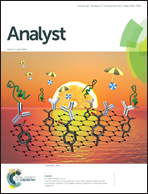Controlling nonspecific trypsin cleavages in LC-MS/MS-based shotgun proteomics using optimized experimental conditions†
Abstract
Trypsin has traditionally been used for enzymatic digestion during sample preparation in shotgun proteomics. The stringent specificity of trypsin is essential for accurate protein identification and quantification. But nonspecific trypsin cleavages are often observed in LC-MS/MS-based shotgun proteomics. To explore the extent of nonspecific trypsin cleavages, a series of biological systems including a standard protein mixture, Saccharomyces cerevisiae, human serum, human cancer cell lines and mouse brain were examined. We found that nonspecific trypsin cleavages commonly occurred in various trypsin digested samples with high frequency. To control these nonspecific trypsin cleavages, we optimized fundamental parameters during sample preparation with mouse brain homogenates. These parameters included denaturing agents and protein storage time, trypsin type, enzyme-to-substrate ratio, as well as protein concentration during digestion. The optimized experimental conditions significantly decreased the ratio of partially tryptic peptides in total identifications from 28.4% to 2.8%. Furthermore, the optimized digestion protocol was applied to the study of N-glycoproteomics, and the proportions of partially tryptic peptides in enriched mixtures were also sharply reduced. Our work demonstrates the importance of controlling nonspecific trypsin cleavages in both shotgun proteomics and glycoproteomics and provides a better understanding and standardization for routine proteomics sample treatment.


 Please wait while we load your content...
Please wait while we load your content...